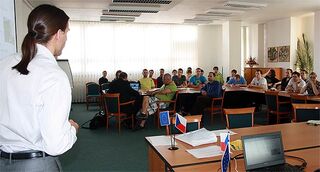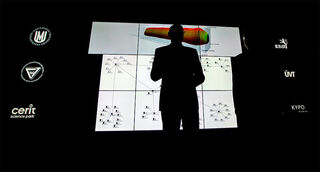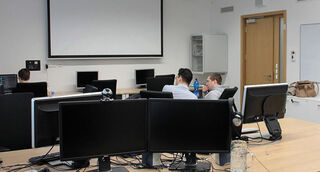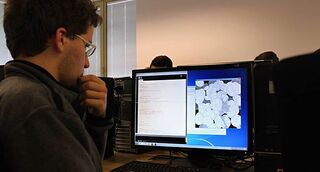Software Systems and Services Management
Degree programme objectives
The study program develops unique competence profile of the student based on the intersection of multiple areas of knowledge that are relevant for managing the development of software systems and services, as well as cybersecurity management. A specific feature is a focus on strategic and operational management related to the targeting, design, implementation, and operation of software systems and services within the context of organizations and different types with a possible focus on their safe operation or IT services. In addition to developing basic theoretical and technological knowledge and practical developmental skills acquired in the bachelor's study, the content of the follow-up study is extended by other dimensions such as theories and practices of team, project and process management, communication, soft skills and knowledge essential to functioning in economic relations - the basics of marketing, law and others, which especially (but not only) concerns the specialization of service development. The cybersecurity study takes into account aspects of overlapping computer data processing outside of tightly defined system perimeters (eg impacting on critical infrastructure), thus enabling a specific multidisciplinary overlap of technical, social and legal aspects in this area.
Study plans
Admission ProceduresAdmission to Master’s programmes in English 2024/2025 (study from spring 2025)Submission deadline until midnight 15/10/2024
- Acceptance round information
Admission procedures for international students who want to study in English master's degree programmes (following bachelor's) beginning from February 2025. The tuition fee is 1500 Eur per semester.
- Information on entrance examinations designed for this degree programmeFor application process, the applicant needs to do the following steps:
- Submit an electronic application including all required documents and pay the application fee 700 CZK.
Detail information see at: https://www.fi.muni.cz/admission/international/guide.html - Evaluation criteria valid for the applicants applying for a place on this degree programmeSee the webpage: https://www.fi.muni.cz/admission/international/info-master.html
Studies
- Objectives
The study program develops unique competence profile of the student based on the intersection of multiple areas of knowledge that are relevant for managing the development of software systems and services, as well as cybersecurity management. A specific feature is a focus on strategic and operational management related to the targeting, design, implementation, and operation of software systems and services within the context of organizations and different types with a possible focus on their safe operation or IT services. In addition to developing basic theoretical and technological knowledge and practical developmental skills acquired in the bachelor's study, the content of the follow-up study is extended by other dimensions such as theories and practices of team, project and process management, communication, soft skills and knowledge essential to functioning in economic relations - the basics of marketing, law and others, which especially (but not only) concerns the specialization of service development. The cybersecurity study takes into account aspects of overlapping computer data processing outside of tightly defined system perimeters (eg impacting on critical infrastructure), thus enabling a specific multidisciplinary overlap of technical, social and legal aspects in this area.
- Learning Outcomes
After successfully completing his/her studies the graduate is able to:
- make reasoned decisions about the benefits of information technologies;
- discuss the support of administration and management in the software life-cycle, together with related social and ergonomical issues;
- use the principles of selected project management techniques in practice;
- competently communicate in their professional life;
- actively participate in teamwork;
- use advanced development tools for enterprise development in real life - specialization Software systems development management;
- make reasoned decisions about service system design and service system innovation - specialization Service development management;
- understand advanced concepts in designing, developing, managing and analyzing security systems - specialization Cybersecurity management.
- Occupational Profiles of Graduates
The graduates find employment in companies and organizations of different sizes and orientation, but they also get the motivation and the possibility of basic preparation for their own innovative business. The strong competitive advantage of the program graduates is the ability to solve complex management-related problems of the development of systems and services for which they can use the acquired skills by the study. Their potential is predestined to hold managerial positions, such as the Chief Information Officer (CIO), project manager, and risk manager. Graduates of the cybersecurity management specialization will find application primarily in companies and institutions that need specialists able to work with relevant coordinating institutions and ensure the management of cybersecurity processes. These are positions as a cybersecurity manager and Chief Information Security Officer (CISO).
- Practical Training
In the Software Systems and Services Management study programme, students complete a compulsory internship of 10 weeks/400 hours within one semester. The student's activities during the internship must correspond to the so-called T-shaped focus, where in-depth knowledge and experience in computer science are required, as well as a broad overview and basic skills in other fields (economics, management, law, etc.). Information on internships can be found in the Course Catalogue, in the study materials of the course or on the website.
- Goals of Theses
The goal of Maters's thesis is to demonstrate that student is capable of working on a project of non-trivial size (e.g. to create a useful application, or to formulate and prove advanced mathematical thesis), as well as to demonstrate the capability of presentation and positioning of the results in the context of actual state-of-the-art in the field. Bachelor's thesis is expected to be written in Czech, Slovak or English language. Expected structure of the work includes declaration of the author about the thesis being a school work, declaration of authorship, contents, the proper text, and references. Minimal expected scope of the work is 40 regular pages of the proper text (including illustrations).
- Access to Further Studies
After completion of the studies, it is possible to continue in doctoral degree programme at the faculty (after satisfying the admission requirements).





